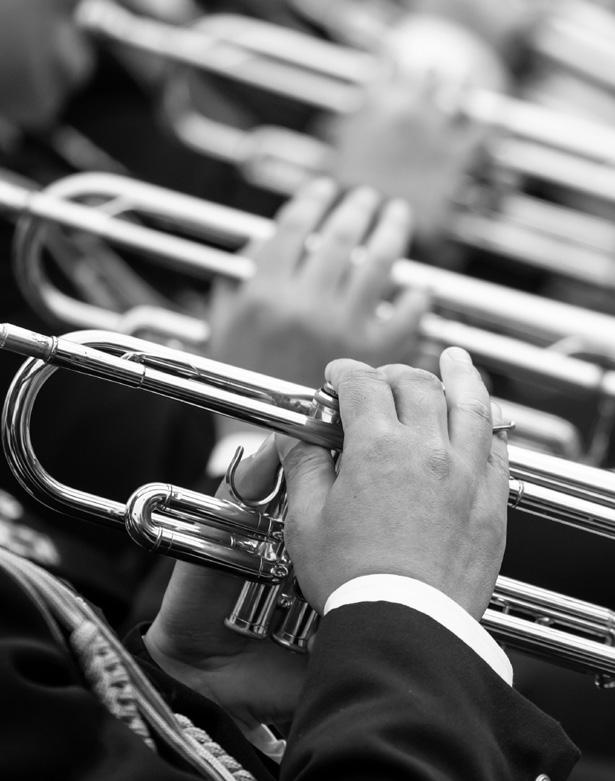
4 minute read
Why Band? Why Now? An Open Letter to Parents and Students Brad Rogers
BY BRAD ROGERS
This is an example of a letter that with some judicious editing to match your individual situation could be sent to parents, students, and other interested parties as we all try to find a way forward from the negative impact of the pandemic and resulting restrictions. It is my hope you can use something from it as a starting point for the encouragement of those connected to your individual programs already, and those making the decision to begin their musical journey.
Dear (parent, student, etc.): I’m admittedly a little biased, but I have come to believe that the study and performance of music may be the most important thing a student can do in school. Music and its elements can be found in and connected to every other academic discipline. Performing music has long been known to be one of the most brainintensive activities a human can do, developing cognitive, creative and motor skills simultaneously. The collaborative music-making that is the very heart and soul of a band experience develops valuable skills that translate into any adult endeavor—persistence, collaboration, empathy, high standards, etc.
You’re reading this because you have made a conscious choice to become involved in actual music-making already. This is only one of the many factors that differentiates performance-based music from the so-called “core” or required subjects studied in our educational system.
Fortunately, this choice draws many bright young people just like you to our music classrooms. By any measure—academic, social, or talent potential—music kids are among the best students in any school. Band directors know that students under their tutelage have made a conscious decision to be in their classroom rather than elsewhere.
The COVID-induced problems affecting all aspects of our daily lives have been magnified in the band room. This is because the ensemble experience is about collaboration, teamwork, and common goals and achievements. It represents the biggest group projects in our school, and it relies upon everyone doing their part well for the group to succeed. For almost two years, restrictions, awkward scheduling, virtual “learning options”, and more than a little well-intentioned contradiction from school decision-makers have conspired to make a normal ensemble experience impossible. It won’t always be like this! It wasn’t B.C. (Before COVID). You can’t really learn to play the trombone on a Chromebook. You can’t replicate a concert or a rehearsal in a Google Meet. I know. I’ve tried, and so have you. The bottom line is that we need each other together if the band thing is going to work and be interesting enough to want to keep doing it.
Learning an instrument is a long-term project. I’ve been playing for many years on my primary instrument and still learn new things every time I put it together. While conducting and teaching has been my job, I’d still much rather be playing my instrument—especially when there are others to play along with. I believe that most band students would agree.
No one can go back and make up for what we have not been able to do since March 2020, but
Brad Rogers was the director of bands at Oldham County High School in Buckner, Kentucky, since 1989, recently retiring after a total of 42 years in music education. He can be reached at ocband1@twc.com. Feel free to contact him.
Why Band? Why Now? An Open Letter to Parents and Students, Brad Rogers, cont.
eventually we will go forward again. Ensembles need students to forge the trail out of the woods—students who are willing to embrace the challenge, and not allow the past to impact the future any longer.
If you’re in a performance ensemble class now, you are the students to which I’m referring! In my own career that touches parts of six decades (late 1970’s-present), you can imagine that I have taught a number of students who started playing in middle school band but dropped out along the way. While each of them had their reasons for not continuing I can honestly say that none of these folks have ever come back and told me they were glad they did not stay in band. In fact, they have been universally regretful about the decision. I’ve also taught a number of their children. Most of these parents did not allow them to make the same mistake they did. Once a student has made the choice to be in a performancebased music class, the real trick is always in keeping them involved.
If you want the school band experience to include working with your friends to …
1. Project excellence from everyone involved, regardless the level of experience.
2. Cultivate a sense of family, with each person knowing they have an important role.
3. Study and perform a rich, significant diet of repertoire in every aspect of the program. 4. Set incremental goals, with each one just out of reach of the current level of proficiency.
5. Be a part of a wide variety of performance opportunities.
6. Put yourself in a position to be successful in your work after high school.
… then you NEED band in your life.
For many, performing in a school ensemble has been the catalyst for a GREAT school experience and the path to success as an adult. Performance ensemble directors want that for you, and you should want that for yourself.










